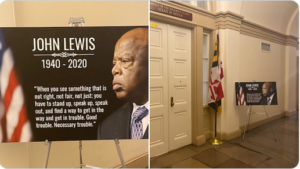Welcome back, Gillings
We look forward to welcoming students, faculty and staff to spring semester 2021 on Tuesday, Jan. 19. To our Gillings students – we missed you. I hope you are more resolute than ever that public health is your chosen profession.
Related Posts
The pandemic has shown that public health touches every sector of society and is more important than ever before. As we anticipate a new administration, I hope that job #1 will be to put the pandemic behind us, and that new government leaders will be guided by data, evidence and the principles of equity as they take on the many upstream and downstream determinants and consequences of the pandemic.
Reaffirming the equity imperative for public health
As we prepare to celebrate Martin Luther King Jr. Day, six months after the death of his protégé and one of my heroes, Congressman John Lewis, and prepare to witness the inauguration of a new president and vice president, we should reflect upon the values that guide our democracy. I particularly appreciate the philosophy of non-violence that King and Lewis shared. It aligns well with the values of public health. Lewis is remembered for having said:
When you see something that is not right, not fair, not just; you have to stand up, speak up, speak out, and find a way to get in the way and get in trouble. Good trouble. Necessary trouble.
He exhorted people to stand up, speak out and act up for justice. Although Lewis and King experienced brutality, they stood for non-violence as a core principle and strategy. It is one that also has guided my actions.
Public health is whole health, including social justice
The Gillings School’s William R. Kenan, Jr. Professor Emeritus of Health Behavior and Health Education John Hatch, PhD, and his colleague, the late physician Jack Geiger, MD, Arthur C. Logan Professor Emeritus of Community Medicine, City University of New York, who twice received a Nobel Peace Prize as part of a group award, showed that non-violence, social justice and public health were inter-related and synergistic when they created the first community health center in Mound Bayou, Miss., in 1965. They did not just offer people health care but also jobs, justice, fresh food, good schools, sanitation and a lot more. They demonstrated the full potential of public health to achieve individual and population health. When criticized by the Mississippi governor for providing food, Dr. Geiger famously said, “Yeah, well, the last time I looked in my medical textbooks, they said the specific therapy for malnutrition was food.” To achieve equity, we must create the conditions for people to thrive, and that is fundamental to public health. The community health center model, which Drs. Hatch and Geiger adopted and adapted from a center in South Africa, lives on today as an enduring legacy of their work. Sadly, Dr. Geiger died December 28, 2020. Dr. Hatch and his wife Fledra, both in their 90s, continue to be role models for public health, and on Jan. 8, they were the first community members in the 75+ age group to be vaccinated against COVID-19 at the Durham County Public Health Department. Best wishes for continued good health to John and Fledra.
Moving forward together
We are living in a divided country, but public health need not be divided nor divisive. On January 25, the Gillings School will host North Carolina state legislators from both parties, as we have before. We have found them to be remarkably interested in public health issues and open to ways of improving the health of their constituents. As we think about the new administration in the White House and leadership in state houses, public health can be a rallying cry for overcoming division. Consider the long tail of public health and our imperative to conceive of health in its broadest definition. Consider the ethics and equity of public health. We should be about principles, parity, values, evidence, ethics, human rights and creating the foundation for a better America where everyone thrives. Each of us can help achieve that dream, that vision which cannot be separated from public health.
There is a lot of anger in the country right now, but we should channel that anger into action that supports the principles I noted above. Dr. Geiger said wisely, “Anger doesn’t vanish, but is replaced by a determination to do something.”
After last week’s events at the US Capitol, Gillings associate professor in the Public Health Leadership Program, Lori Carter-Edwards, PhD, expressed similar determination when she said:
I do not have the luxury to be angry, not as a leader, a U.S. citizen, a voter, a Black person, a daughter, a mother, a woman and a person of faith. As such, the energy it takes to be angry has to be put to use to create change, and anger . . . and hate take a lot of energy. That energy, which is quite powerful, can and should be placed elsewhere, for immediate as well as long-term constructive change.
As we look forward to a new semester, it is a good time to move into action. Be determined to do something, as Dr. Geiger said. If you are angry, put your anger to use to create constructive changes, as Dr. Carter-Edwards suggested. Strive to leave this world a better place, as the late North Carolina Rep. MaryAnn Black worked to do. When it comes to public health, everything is interconnected, and each of us can make a difference. If we are determined, together, we can do so much more. We welcome you back for spring semester 2021.
With warm regards,
Barbara


